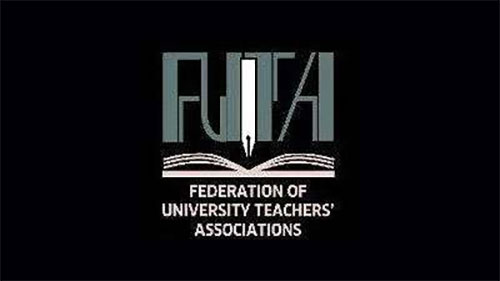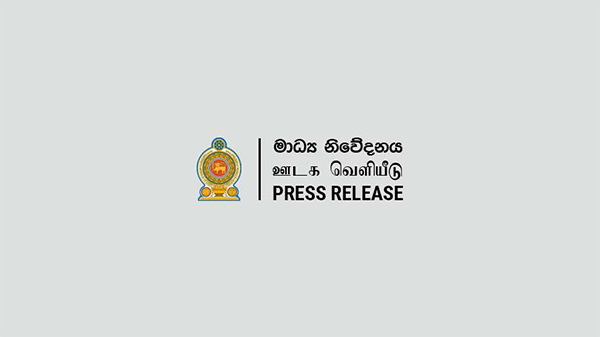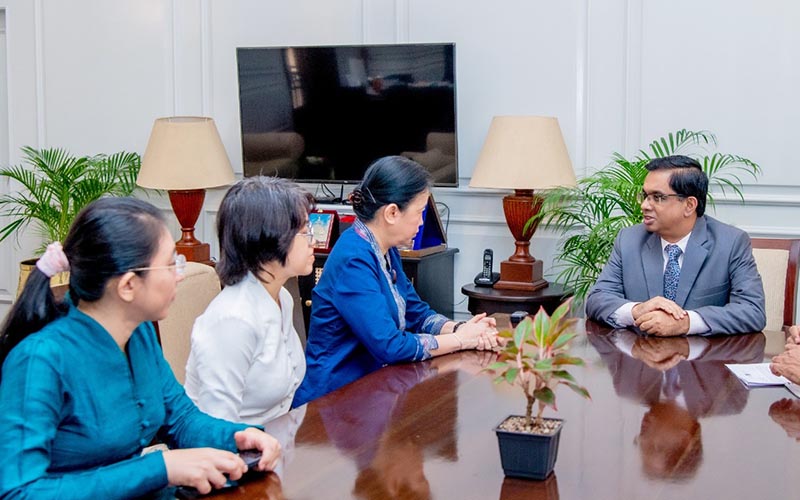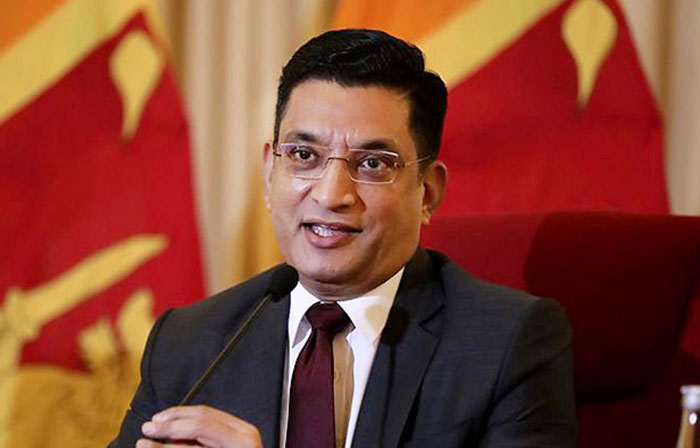News
FUTA condemns state violence against protesting students

The illegitimate government led by Ranil Wickremesinghe continues to resort to State violence in suppressing peaceful protests with impunity. On March 8 the State used brutal police force to disperse a peaceful protest march led by the Inter University Students Federation (IUSF), even invading the University of Colombo to do so, the Federation of University Teachers (FUTA) said in a statement last week. Full text of the statement: The Police was not content to disperse the protesting students using tear gas and water cannons, but also forcibly entered the University of Colombo premises without any lawful authorization and indiscriminately and arbitrarily attacked students who were in the university, some of whom had taken no part in the protest march, thereby blatantly disregarding any semblance of respect for the rule of law.
Students, academics and other bystanders were gratuitously targeted during this unprecedented and vicious attack carried out within the premise of an university. The conduct of the Police is a deliberate and flagrant violation of university autonomy — a cherished principle upon which our university system has been built, and which has been upheld by successive regimes in the past.
Not chastened by the fact that such state terror resulted in the death of one person who was attacked within the university premises, the Police continued to target protesters outside the University of Kelaniya on March 9 as well.
The Federation of University Teachers Association (FUTA) vehemently condemns the ruthless and unprovoked behavior exhibited by the Police in attacking students. The perpetrators of these cowardly and unlawful acts, as well as those whose orders were being followed by these perpetrators, must be punished to the fullest extent of the law.
The right to peaceful assembly and association is a fundamental right of all citizens, which is well recognized by the supreme law of our land. The country has witnessed a systematic assault on these very rights during the past few months, ever since Ranil Wickremesinghe was “elected” President by Parliament in July 2022.
The Government has adopted an illegal zero-tolerance policy towards any organized protest march and has repeatedly used violence, in the extreme, in dispersing street demonstrations.University students, trade unions, including FUTA, and even major political parties have been subjected to this inhuman repression in the recent past.
Peaceful demonstrations have been an integral part of our democracy ever since the country obtained independence. Citizens of this country have exercised their right to dissent through collective demonstrations whenever they were dissatisfied with government policies. These demonstrations took different forms, from street marches to pada-yathras or janagoshas that lasted for days.
The conduct of the current regime to impose an absolute ban on any mass demonstration is without precedent in our history, without merit within the law, and, moreover, it contravenes the fundamental values of a democratic society. We are living in times where ruthless and unjust economic reforms are imposed on the masses. The lower- and middle-income populations in the country are disproportionately burdened due to the so-called austerity measures the Government has imposed on them.
Arbitrary and unfair increase of taxes, the escalation of electricity and fuel prices due to the removal of subsidies, again disproportionately affecting the poor, high interest rates, and the suspension of state expenditure, have severely impacted the livelihoods of millions of citizens.
These measures are imposed by a President who was never elected through a popular mandate. To make matters worse, the President also refuses to conduct elections that are legally due, and therefore continues to govern without the consent of the governed.
This tendency of rising political authoritarianism accompanied by a harsh economic austerity that is oriented towards a neoliberal ideology poses a fundamental threat to the democratic fabric of this country. Prohibiting demonstrations, attacking protesters, illegally preventing elections, the use of repressive laws to restrict trade union activities, are all part and parcel of a larger authoritarian drive that should be vigorously and steadfastly challenged.
FUTA calls upon all citizens, organizations and forces that value democracy and basic civil liberties to oppose the illegitimate and inhuman conduct of this government. We wish to warn the Government that as the trade union federation representing the academic community in the country, FUTA will stand in solidarity with the people to the very end in order to defeat all such acts of state terror and injustice.
We recognize that in attacking peaceful protesters the Government is demonstrating the fact that it feels threatened by our voices and collective strength. They fear the inevitable triumph of justice over brute force. We are not afraid, nor will we back down.
Hence, this use of the Police as a weapon in the Government’s arsenal of terror must stop immediately. Impunity and utter callousness of this kind must be halted both by legal challenges and public outrage. FUTA pledges its commitment to stand up and fight against an illegitimate government’s illegal agenda and seeks the public’s continued support to ensure victory.
News
34 new projects under “Clean Sri Lanka” programme this year

Under the guidance of President Anura Kumara Disanayake, the “Clean Sri Lanka” programme, implemented as a key government initiative is set to launch 34 new projects this year, and work on many of these projects is scheduled to commence by the end of this April.
In line with this, a one-day workshop was held on Thursday (10) at the “Clean Sri Lanka” Secretariat located in the Lotus Building at the Temple Trees, under the leadership of Secretary to the President Dr. Nandika Sanath Kumanayake. The workshop provided technical guidance on preparing project proposals in accordance with the formats required by the Department of National Planning for submission and approval.
The “Clean Sri Lanka” programme aims to foster social, environmental and ethical transformation across the country, with the active participation of all stakeholders. A sum of Rs. 5 billion has been allocated from this year’s national budget for its implementation.
Once the Department of National Planning grants approval for the proposed projects, detailed action plans will be developed in line with prescribed formats. It was agreed that projects deemed ready for implementation will commence before the end of April.
During the workshop, Secretary to the President outlined the government’s expectations and the intended outcomes of the “Clean Sri Lanka” programme.
Senior officials representing the Ministry of Public Administration, Provincial Councils and Local Government, Ministry of Foreign Affairs, Foreign Employment and Tourism, Ministry of Health and Mass Media, Ministry of Education, Higher Education and Vocational Education, Ministry of Transport, Highways, Ports and Civil Aviation, Ministry of Public Security and Parliamentary Affairs, Ministry of Agriculture, Livestock, Lands and Irrigation, Ministry of Digital Economy, Ministry of Urban Development, Construction and Housing, Ministry of Environment, Ministry of Industries and Entrepreneurship Development, Sri Lanka Police, and the Western Provincial Council were in attendance.
Also present were Engineer S.P.C. Sugeeshwara, Additional Secretary to the President (Clean Sri Lanka Programme) and G.M.R.D. Aponsu, Senior Additional Secretary to the President (Finance and Economic Affairs), along with other senior officials.
[PMD]
News
Financial assistance of USD 01 Million for the Disaster-Affected People of Myanmar

The Government of Sri Lanka has extended financial assistance amounting to USD 01 Million to provide relief to the people of Myanmar affected by the recent earthquake.
The relevant cheque was officially handed over by the Secretary to the President, Dr. Nandika Sanath Kumanayake, to the Ambassador of Myanmar to Sri Lanka, Marlar Than Htaik.on Thursday (10) at the Presidential Secretariat.
Despite the prevailing economic challenges in Sri Lanka, the Ambassador of Myanmar expressed her deep appreciation to President Anura Kumara Disanayake and the Government of Sri Lanka for this gesture of solidarity and support towards the disaster-stricken people of Myanmar.
Furthermore, the Ambassador extended her gratitude for Sri Lanka’s decision to deploy relief teams and medical personnel during this difficult time. She also noted that such acts of compassion further strengthen the longstanding religious and cultural friendship between Sri Lanka and Myanmar.
The Ambassador also briefed the Secretary to the President on the current situation in Myanmar following the earthquake.
Senior Additional Secretary to the President, Roshan Gamage, along with officials from the Embassy of Myanmar, Winh Wint Khaus Tun and Ms. Lei Yi Win, were also present at this occasion.
[PMD]
News
Indo-Lanka MoUs unlikely to be tabled in Parliament any time soon

…of seven SOCs only one constituted so far
Sri Lanka’s controversial MoU on Defence Cooperation with India was unlikely to be taken up any time soon in Parliament in spite of the House Sectoral Oversight Committee (SOC) on Governance, Justice and Civil Protection that has been assigned defence, authoritative sources told The Island.
Of the seven SOCs only one was activated with the recent election of Dr. Najith Indika, MP, as the Chairman of the Sectoral Oversight Committee on Governance, Justice, and Civil Protection of the Tenth Parliament.
The inaugural meeting of the current parliament was held on 21 Nov., 2024.
Sources said that the parliament had met for the last time yesterday (10) before the Sinhala and Tamil New Year holiday. It is scheduled to meet again on May 8.
The UNDP that has financially backed the establishment of the SOC system to help strengthen the role of the parliament recently reached a consensus with the government to reduce the number of SCOCs from 17 to seven. The Island, in writing, asked for the UNDP’s reaction to the operation of SOCs but had not received a response at the time this edition went to press.
The SOCs have the power to examine any Bill, except the Bills defined in Article 152 of the Constitution, Treaty, Reports including the Annual and Performance Reports relating to the institutions coming under its purview or any other matter referred to the Committee by Parliament or any Committee or a Minister relating to the subjects and functions within their jurisdiction.
Sources said that out of the seven SOCs only one had been activated during the past five months though the government and the Opposition agreed to share the leadership of them.
Accordingly, it was agreed that the government would appoint chairpersons to four SOCs –– Economic Development and International Relations, Health, Media and Women’s Empowerment, Science, Technology and Digital Transformation and Governance, Justice and Civil Protection .
It was also agreed that the Opposition would appoint chairpersons to the SOCs on Infrastructure and Strategic Development, Education, Manpower and Human Capital, and Environment, Agriculture and Resource Sustainability to the Opposition.
India and Sri Lanka on April 5 signed six MoUs on HVDC interconnection for import/export of power, cooperation in the field of sharing successful digital solutions implemented at population scale for digital transformation, defence cooperation, multi sectoral grant assistance for Eastern province, health and medicine and pharmacopoeia cooperation. In addition to them, India, Sri Lanka and UAE signed a tripartite MoU cooperation in development of Trincomalee as an energy hub.
The Island asked Ali Sabry, PC, who served as foreign minister during Ranil Wickremesinghe’s tenure as the President (July 2022 to Sept 2024) whether the seven MoUs had been discussed during that period. We also asked him whether those MoUs should have been discussed at SOCs before finalisation.
Sabry said: “Most of the MOU to my knowledge were discussed except the one on Defence Cooperation, which I am unaware of. General procedure is the relevant line ministry prepares the initial draft and gets the input from the Foreign Ministry and goes for stakeholder consultation of all ministries and agencies involved. Then the President’s Office grants its sanction and with the approval of the AG, it goes before the cabinet of ministers. With Cabinet approval, the government could sign the MOU.”
Sabry said that he was of the opinion that once the government signed a particular MoU, it should be placed before the parliament. “MOU’s are generally not legally binding and only signify the desire to work together. If the signed MoUs were to be implemented, then they have to be followed by agreements or laws.”
He emphasised the pivotal importance of transparency in the whole process. The ex-minister said: “I think transparency is crucial in these matters. Concealment leads to speculation and assumption of the worst. The MOUs should be tabled in Parliament for public information. Discussion at the relevant SOCs would have been helpful. There are growing fears fueled by lack of information in the public domain. This is a private comment, not to be attributed to me.
Asked whether MoUs, particularly the ones on defence and energy had to be approved by the Attorney General, the former minister said that the AG has to advise the MoUs compatibility with the Constitution. “But Article 157 of the Constitution does not apply; the 2/3 majority stipulated there envisages only investment treaties.” Foreign Minister Vijitha Herath assured Parliament on April 8 that the AG had cleared all seven MoUs and none of them were inimical to the country.
By Shamindra Ferdinando
-

 Business5 days ago
Business5 days agoColombo Coffee wins coveted management awards
-

 Business7 days ago
Business7 days agoDaraz Sri Lanka ushers in the New Year with 4.4 Avurudu Wasi Pro Max – Sri Lanka’s biggest online Avurudu sale
-

 Features6 days ago
Features6 days agoStarlink in the Global South
-

 Business7 days ago
Business7 days agoNew SL Sovereign Bonds win foreign investor confidence
-

 Features3 days ago
Features3 days agoSri Lanka’s Foreign Policy amid Geopolitical Transformations: 1990-2024 – Part III
-

 Features6 days ago
Features6 days agoModi’s Sri Lanka Sojourn
-

 Midweek Review3 days ago
Midweek Review3 days agoInequality is killing the Middle Class
-

 Features5 days ago
Features5 days agoSri Lanka’s Foreign Policy amid Geopolitical Transformations: 1990-2024 – Part I











